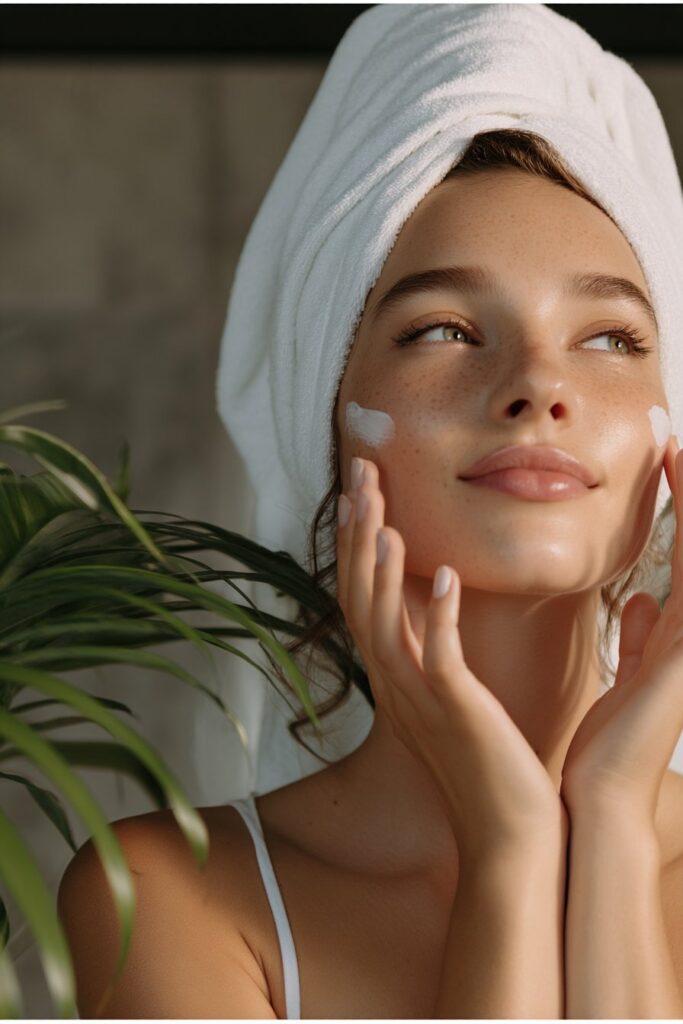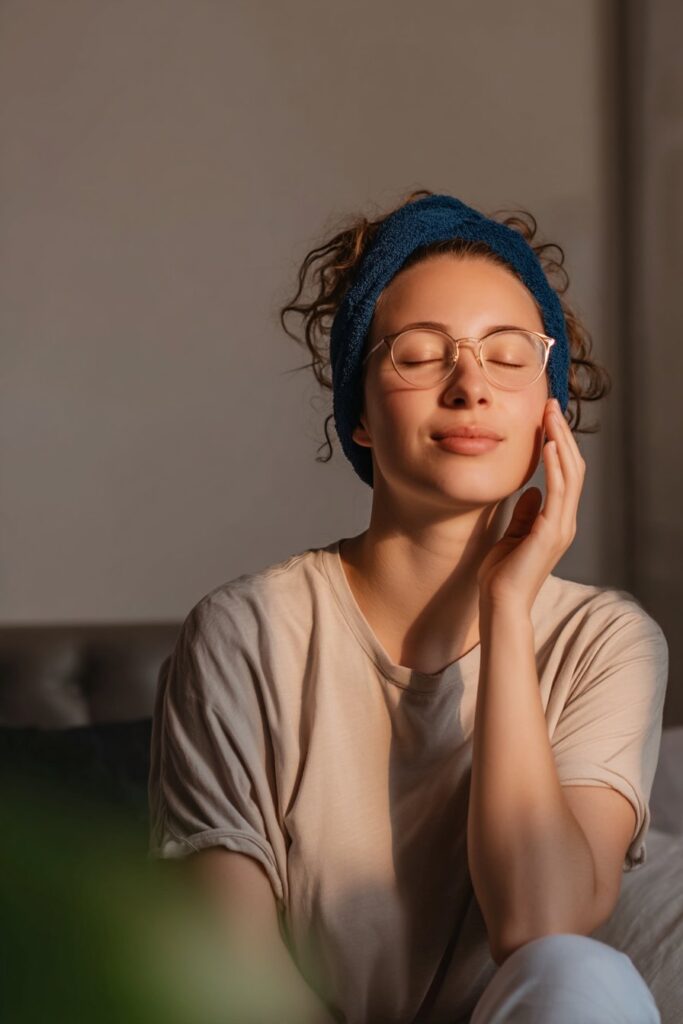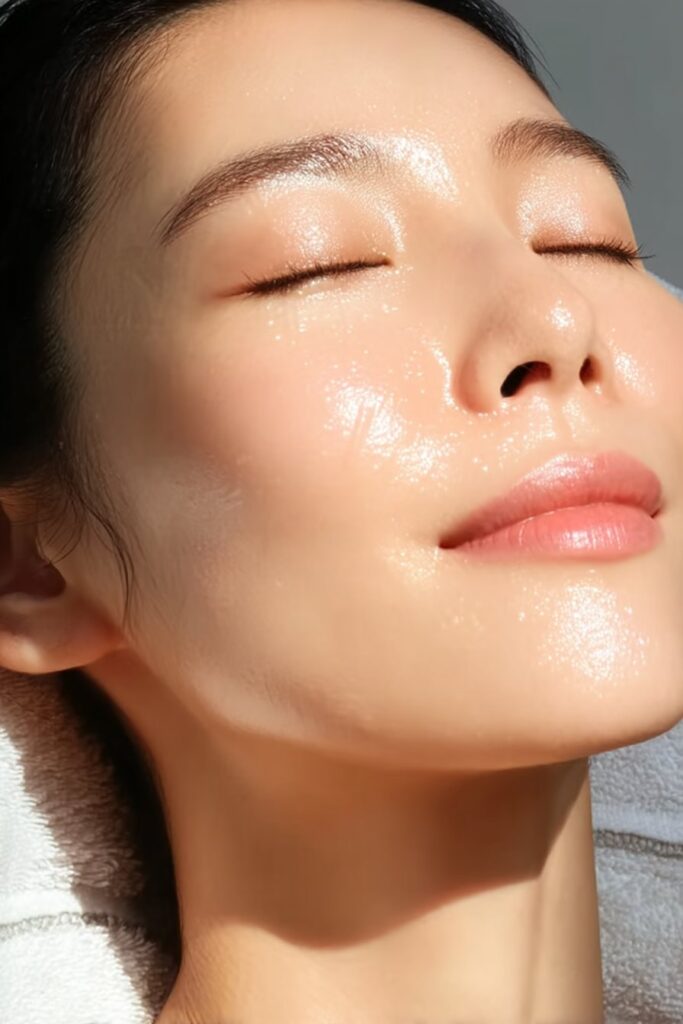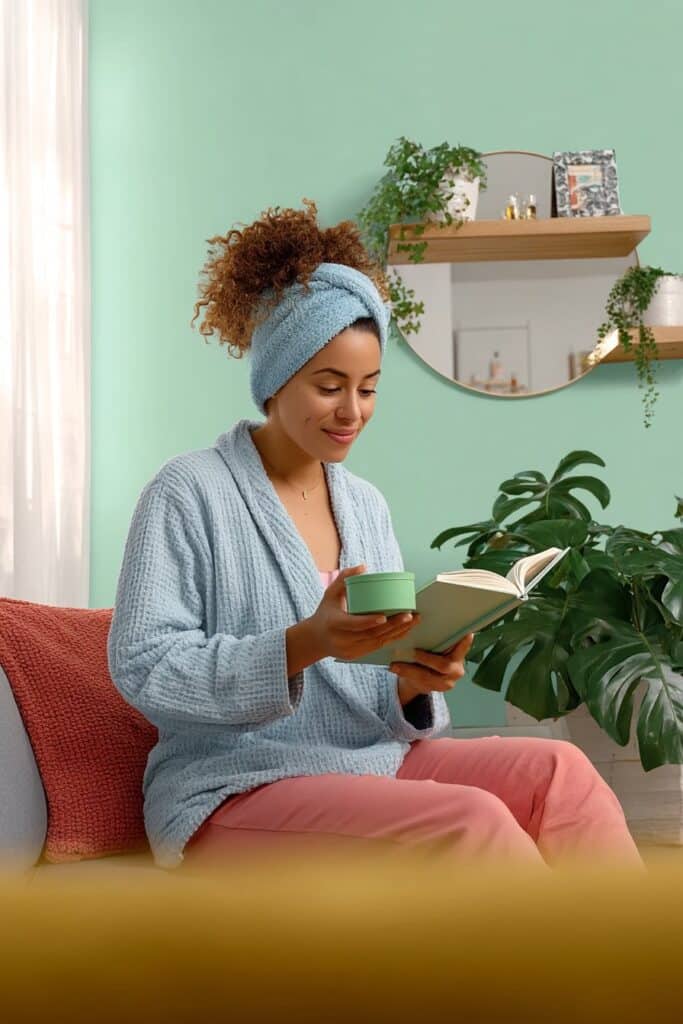Skincare as self care transformed my approach to mental wellness when I discovered its profound impact beyond just appearance. According to the World Health Organization, one in eight people globally were living with a mental disorder in 2019, with anxiety and depression being the most common. In fact, almost 45% of Australians are expected to experience a mental illness in their lifetime. These statistics highlight why we need accessible, daily mental health practices.
The connection between skincare wellness and mental health is surprisingly powerful. When I incorporate a beauty self care routine into my day, I’m not just improving my skin—I’m creating a moment of mindfulness and calm. Research indicates that these consistent routines enhance self-perception, boost confidence, and lead to increased happiness. Beyond the physical benefits, skin care is self care because it provides structure in our often chaotic lives. Studies published in Lancet Psychiatry found that individuals with fewer consistent daily routines were more likely to experience depression, mood problems, and loneliness.
As a makeup artist, I’ve witnessed firsthand how skincare and mental health are interconnected. The gentle massage of facial oils, the calming scents of botanical ingredients, and the simple act of taking time for yourself all trigger feel-good neurotransmitters in the brain. When clients establish their own skincare rituals, they often report not just better skin, but reduced stress and improved emotional wellbeing.
Why skincare is more than just skin deep

Beyond beautifying our exterior, skincare has evolved into a powerful mental wellness practice. Throughout my years as a makeup artist, I’ve witnessed its profound impact on both skin health and emotional well-being. The relationship between our skin and our mental state isn’t merely anecdotal—it’s backed by science and countless personal transformations.
How skincare became part of my self-care journey
Growing up in Savannah, my relationship with skincare began simply by watching my mother’s evening routine. However, it wasn’t until I was struggling with burnout during fashion week season that I truly discovered skincare’s deeper benefits.
After long days applying makeup on others, I found myself craving those quiet moments alone with my cleansers and serums. What started as basic hygiene transformed into a sacred ritual that marked the transition from my professional self to my personal self. Each evening, as I massaged products into my skin, I noticed my racing thoughts slowing down.
Research confirms what I experienced intuitively—engaging in repetitive, soothing activities like applying skincare products lowers cortisol levels (the stress hormone). This physiological response explains why those ten minutes became my mental sanctuary.
The emotional impact of daily rituals
The consistency of a skincare routine creates a powerful psychological anchor. During particularly chaotic times in my career, these morning and evening rituals provided stability when everything else felt unpredictable. Many women report similar effects, with studies showing skincare routines enhance overall quality of life by boosting feelings of attractiveness, self-confidence, empowerment, and happiness.
The sensory experience is particularly potent for emotional regulation:
- Touch: The gentle pressure of facial massage activates your parasympathetic nervous system, promoting relaxation
- Scent: Essential oils and fragrances can immediately shift your mood—citrus invigorates while lavender calms
- Texture: The tactile sensation of products creates mindful awareness, pulling us into the present moment
Furthermore, 95% of people report that these sensory-related aspects enhance their mood. I’ve seen clients visibly relax as I apply products during treatments, their shoulders dropping and breathing deepening before any product has had time to affect their skin.
Why skin care is self care
When we engage in skincare practices, we’re giving ourselves permission to slow down. This isn’t vanity—it’s a conscious decision to honor ourselves amid busy schedules. Much like exercise or healthy eating, skincare reinforces the belief that we deserve kindness and attention.
Additionally, the confidence boost from healthy skin extends beyond appearance. Research indicates that enhanced self-esteem from effective skincare can reduce stress and anxiety, positively influencing gut health and brain function. I’ve witnessed this transformation countless times with clients who begin practicing consistent skincare routines—not only does their complexion improve, but they carry themselves differently, make better eye contact, and speak more confidently.
The act of caring for your skin sends a powerful message: “I matter”. In a world that constantly demands our attention externally, turning that attention inward—even briefly—is a radical act of self-preservation. That’s why I believe skincare isn’t a luxury but a necessity for mental wellness.
The mental health benefits of a consistent routine

The structure of a daily skincare routine offers more than just esthetic benefits—it provides a mental framework that can significantly impact our emotional wellbeing. As someone who travels frequently for fashion shows and client appointments, I’ve discovered that my skincare rituals serve as an anchor amidst unpredictable schedules and changing environments.
Creating structure in chaotic times
In our fast-paced world, many of us struggle to find stability. I’ve noticed this especially during fashion week seasons when everything feels like a whirlwind. Throughout these chaotic periods, my morning and evening skincare routines remain constant—a steady rhythm when everything else feels out of sync.
Research confirms this isn’t just my personal experience. Studies show that routines can literally “save lives and sanity”. During the Chilean mining crisis in 2010, leaders quickly established set routines for the 33 trapped men—mealtimes, work schedules, and a buddy system—to prevent mental deterioration during their ordeal. While our daily challenges may not be as extreme, the psychological principle remains the same.
For many of my clients who struggle with anxiety, establishing a consistent skincare routine provides what one researcher describes as “a sanctuary where you have total control over what happens”. This sense of control helps ease stress and provides stability to your day, acting almost like a security blanket during turbulent times.
How routines reduce anxiety and depression
Through my years working with clients of all backgrounds, I’ve witnessed how a simple skincare regimen can transform someone’s mental state. One memorable client came to me during a particularly difficult divorce—she later told me that her evening skincare routine became the one peaceful moment in otherwise emotionally charged days.
Consistent skincare practices create what psychologists call “structure and routine,” which can be especially helpful during times of change or uncertainty. Studies indicate that engaging in mindful skincare practices can help reduce anxiety and depression by providing an opportunity for a few moments of self-care, especially when feeling overwhelmed.
The benefits extend beyond just the moment of application:
- Stress reduction: The act of cleansing, massaging, and moisturizing triggers endorphin release—similar to what happens during other self-care practices
- Improved sleep: Following a regular evening skincare routine signals to your body it’s time to unwind, improving sleep quality
- Enhanced mood: 95% of people report that sensory aspects of skincare products enhance their mood
Moreover, research published in Psychological Science found a connection between concentrated time with loved ones pursuing enjoyable activities and greater levels of happiness. I’ve experienced this firsthand when teaching friends new skincare techniques during our girls’ nights—creating bonds through beauty rituals.
The science behind skincare and mental health
The connection between skin health and mental wellbeing isn’t just anecdotal—it’s rooted in physiological responses. A groundbreaking study measured participants receiving facial skincare compared to those merely resting. The results were remarkable: facial skincare induced cerebral relaxation 42% higher, cardiac relaxation 13% higher, respiratory relaxation 12% higher, and muscular relaxation 17% higher than just resting.
Scientists now recognize what they call the “skin-brain axis”—a bidirectional communication between skin and brain. This connection means caring for your skin directly influences your mental health and vice versa.
This explains why chronic stress (with elevated cortisol levels) can exacerbate skin conditions like acne and eczema. Consequently, a regular skincare routine can help break this cycle by reducing stress, which in turn lowers cortisol levels, benefiting both mental health and skin condition.
The sensory experience plays a crucial role too. New research shows that what we put on our skin can directly and indirectly influence the gut-skin-brain axis through multiple pathways, including improving skin barrier function, reducing inflammation, and maintaining microbiome balance. I’ve seen this effect with clients who initially sought help for skin problems but discovered unexpected mental health benefits along the way.
Indeed, skincare has moved far beyond the realm of just trying to look good—it’s about taking back time to focus solely on yourself. In essence, establishing a consistent skincare routine might be one of the simplest yet most effective steps you can take toward improving your mental wellbeing.
How skincare activates your senses and mood

First and foremost, what makes skincare so powerful as a self-care practice is how deeply it engages all of our senses. The simple act of applying products creates a multi-sensory experience that directly affects our brain chemistry and emotional state.
The power of scent and texture
Have you ever noticed how certain skincare scents can instantly shift your mood? There’s science behind that reaction. Your nose is directly wired to your brain’s emotion center—the limbic system—allowing scents to trigger immediate emotional responses.
In my studio, I often observe clients visibly relax when applying products with lavender or chamomile, whereas citrus-based formulations tend to energize and brighten their mood. These responses aren’t just psychological preferences; they’re neurological reactions.
Specific fragrances can:
- Reduce stress by activating calming brain pathways
- Boost mood by triggering endorphin release
- Enhance focus through stimulating scents like mint
- Create positive memory associations
Even the texture of products plays a crucial role. Research from Clinique found that almost 60% of participants reported a product’s texture directly impacted their mood. As I massage a silky serum into a client’s skin, I can literally see tension melt away before any active ingredients have time to work.
Touch as a calming tool
The gentle pressure of skincare application activates something truly remarkable in our bodies. Scientists have discovered specialized nerve fibers called C-tactile fibers that respond specifically to gentle, low-force stroking—exactly the kind we use when applying skincare products.
Throughout my career, I’ve witnessed how a two-minute facial massage can transform someone’s entire demeanor. This happens because touch reduces cortisol (the stress hormone) while simultaneously releasing oxytocin (the “love hormone”), creating an immediate sense of calm and connection.
Studies show that massage therapy in hospital settings has become increasingly recognized as a complementary treatment, with over 80% of surveyed hospitals offering it. The effect is so powerful that even self-massage during your skincare routine can slow your heart rate and lower stress levels.
Happy hormones and how they’re triggered
Applying skincare products stimulates a cascade of “happy hormones” that measurably improve your mood. These include:
- Dopamine: The “feel-good” neurotransmitter released when you experience the pleasure of a beautiful skincare ritual
- Serotonin: Remarkably, your skin actually produces this “happiness hormone” just like your brain does
- Oxytocin: Released through touch, creating feelings of trust and connection
- Endorphins: Your body’s natural pain relievers, triggered by pleasant sensory experiences
In fact, one groundbreaking study measured that facial skincare induced 42% higher cerebral relaxation, 13% higher cardiac relaxation, and 17% higher muscular relaxation than simply resting. Therefore, the mood-boosting effects aren’t just psychological—they’re physiologically measurable.
This biochemical response explains why, after teaching clients personalized skincare routines, many report back not just about improved skin, but about feeling more centered and peaceful overall.
Skincare as a confidence and connection booster

In my years as a makeup artist, I’ve witnessed a remarkable truth: the relationship between looking good and feeling good creates a powerful cycle in our lives. Research confirms this observation—people with a positive self-image experience less anxiety, increased motivation, and greater success in both personal and professional relationships.
Feeling good in your skin builds self-esteem
Caring for your skin consistently creates visible improvements that enhance self-confidence. As I tell my clients in Savannah when they visit my studio, skincare isn’t about achieving perfection—it’s about feeling in control of your appearance. Studies show that when people’s skin health improves, there’s a noticeable shift in their mood. Yet the benefits extend beyond mere appearance:
- Clear, healthy skin boosts self-assurance in every area of life
- Taking time for skincare reinforces that you deserve kindness and attention
- The act of caring for yourself sends a powerful message: “I matter”
Sharing beauty self care routines with others
Throughout my career, I’ve noticed how beauty rituals create natural opportunities for connection. At first glance, skincare might seem like a solitary activity, albeit one that’s increasingly shared on social media platforms. In fact, research shows that women rely significantly on social media, clinics, friends, and beauty influencers for skincare advice.
Skincare wellness as a bonding experience
Some of my most cherished memories involve teaching friends new techniques during our gatherings. These moments transform into something far more meaningful than just applying products—they become shared experiences that strengthen our bonds.
Despite the fact that beauty standards have received criticism, initiatives like Dove’s Self-Esteem Project (celebrating its 20th anniversary in 2024) demonstrate how skincare and beauty conversations can foster positive community engagement. Additionally, workshops centered around skincare create networks of friendship and empathy that enrich everyone’s wellness journey.
Among the chaos of my busy travel schedule, these connections remind me that self-care isn’t selfish—it’s essential. The confidence we gain through healthy skin radiates outward, creating a positive cycle that affects how we show up in the world and interact with others.
Simple ways to start your self care skincare habit

Getting started with a self-care skincare routine doesn’t require expensive products or complicated steps. Throughout my years working with clients, I’ve found that simplicity is often the key to creating lasting habits that benefit both your skin and mind.
Start small: cleanse and moisturize
First and foremost, begin with just two essential steps: cleansing and moisturizing. This simple foundation is powerful enough to transform your relationship with your skin. In my Savannah studio, I always tell newcomers to skincare that consistency with these basics will yield better results than sporadic use of complex routines.
For your morning routine, cleanse to remove any sweat or oil from your pillow, then follow with a hydrating moisturizer. At night, cleansing becomes even more crucial as it removes makeup, pollution, and daily buildup from your skin. Choose a gentle, hydrating cleanser that won’t strip your skin’s natural moisture.
Create a calming atmosphere
Setting the stage for your skincare ritual dramatically enhances its mental health benefits. Before beginning my nighttime routine, I dim the lights, light a scented candle, and play soft music to signal to my brain it’s time to unwind. This environmental shift helps create what I call a “transition moment” between the busy day and restful evening.
Consider incorporating aromatherapy through essential oils—lavender, chamomile, or ylang-ylang are particularly calming. Subsequently, this sensory experience elevates a simple skincare routine into a mindfulness practice that grounds you in the present moment.
Switch it up with masks or tools
Once your basic routine feels comfortable, introduce weekly treatments like face masks. These provide not only additional skin benefits but essentially create mini “spa moments” at home. I often suggest starting with a hydrating mask applied after cleansing but before moisturizing.
Face massage tools can likewise enhance your experience—jade rollers or gua sha stones help products absorb better plus provide moment of therapeutic touch. Even just using your fingertips to massage products with gentle pressure activates those calming touch receptors.
Make it your own ritual
Above all else, personalization makes your skincare routine a true self-care practice. There’s no one-size-fits-all approach—what works for someone else may not work for you. The key is finding what feels both effective and enjoyable enough to maintain consistently.
In particular, focus on making this time sacred—free from distractions and interruptions. Whether it’s morning or evening, these few dedicated minutes send a powerful message that you value yourself enough to pause and connect with your needs.
Conclusion
Throughout my journey as a makeup artist, I’ve witnessed skincare transform from a simple beauty routine into a profound mental wellness practice. Ultimately, the gentle ritual of caring for our skin offers benefits far beyond what appears in the mirror. Indeed, these moments of pause create a sanctuary in our busy lives, activating our senses and releasing those precious “happy hormones” that regulate our mood and stress levels.
My clients frequently tell me how their evening skincare rituals have become their favorite part of the day. Though skincare products certainly help improve complexion concerns, the act of showing up for yourself consistently matters most. This consistent practice builds resilience during chaotic times, subsequently strengthening our emotional wellness through routine and structure.
Above all, remember that skincare as self-care doesn’t require expensive products or elaborate multi-step routines. Starting with basic cleansing and moisturizing while creating a calming atmosphere can powerfully impact your mental wellbeing. The confidence boost extends into every area of life, affecting how you show up in relationships and professional settings.
Finally, skincare creates beautiful opportunities for connection. Some of my most treasured memories involve sharing techniques with friends during casual gatherings that evolved into deep conversations and strengthened bonds. These moments remind me that true self-care isn’t selfish—it’s essential maintenance for our emotional health.
Therefore, consider your skincare routine not just as a beauty regimen but as a daily mental health practice. Taking these few minutes to connect with yourself might just become the most powerful wellness habit in your daily life.
